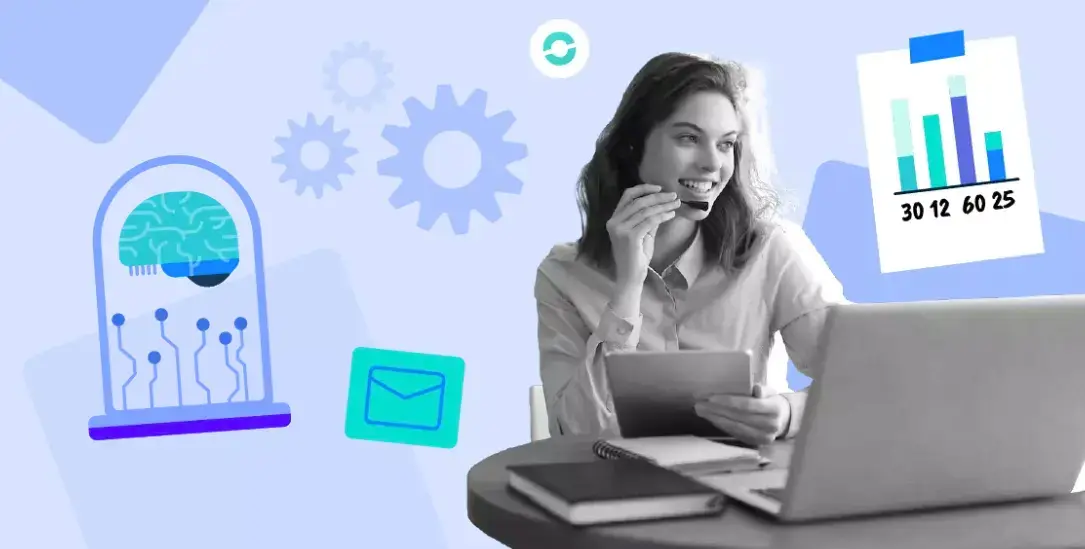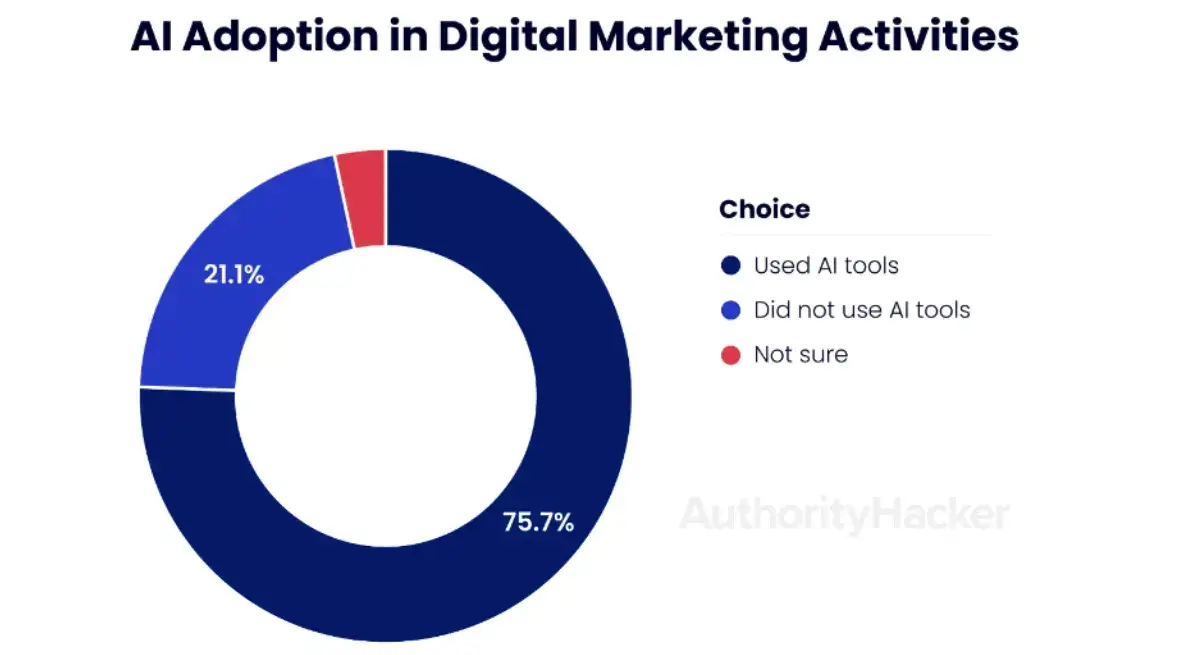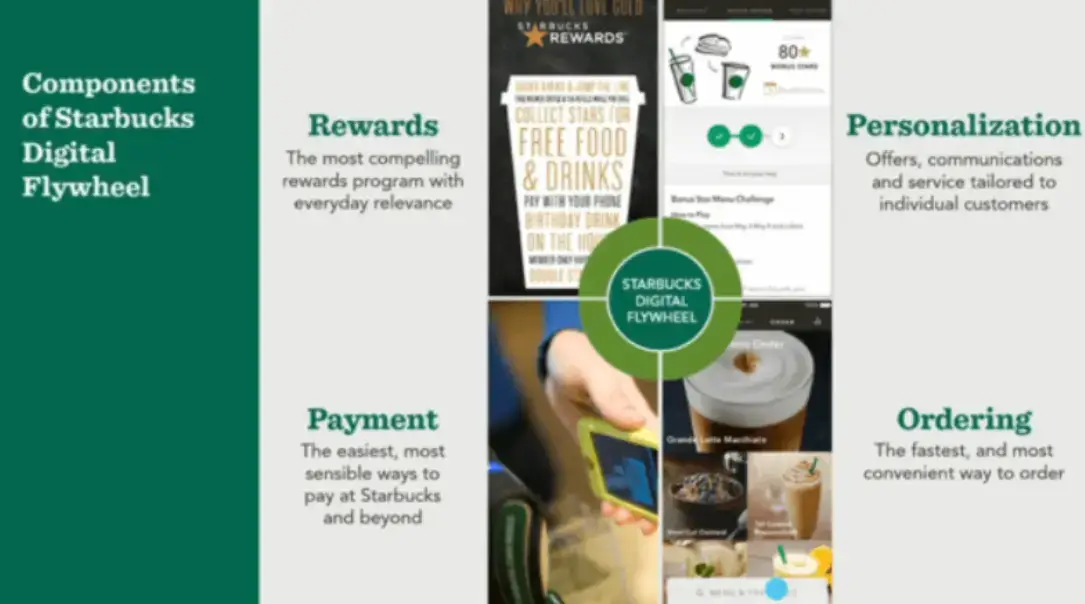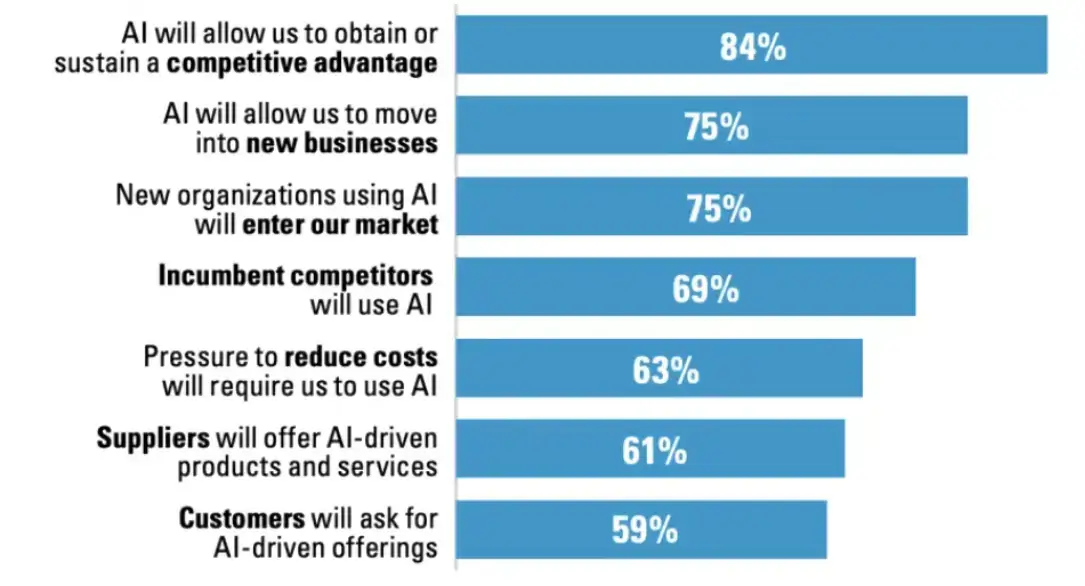You know how online marketing is super important for any business, right? But it can also be super hard when you work remotely.
You have to deal with different time zones, communication barriers, and a need for face-to-face interaction. How can you make your online marketing better? Well, one way is to use artificial intelligence (AI).
With AI, remote teams can make their online marketing more manageable. AI can do the tedious, hard work for them, like sorting data and handling routine tasks.
In this article:
- How AI is Changing Online Marketing
- Why You Should Use AI for Online Marketing
- AI Tools and Platforms for Remote Marketing Teams
- AI Strategies for Online Marketing
- Overcoming Challenges of Implementing AI

Let’s talk about how AI can help remote teams improve their online marketing performance, and the best practices and tools to implement AI.
We will also learn about the challenges of using AI for online marketing.
How AI is Changing Online Marketing
AI is not a new concept, but it is becoming more accessible and powerful by the day. AI can help online marketers in many ways, such as:

Source: Authority Hacker
Data analysis
AI can process and interpret large amounts of data, such as customer behavior, preferences, feedback, and trends.
This can help marketers understand their customers better and tailor their marketing campaigns accordingly, said Travis Kliever, Global Business Development Advisor at RemotePad.
Content creation
AI can generate relevant, engaging, and personalized content for each customer. It can include text, images, videos, and audio. AI can also optimize the content for SEO and conversions.
Customer experience
AI can improve the customer journey by providing personalized recommendations, offers, and support.
Emily Rapoza, Marketing Manager at Library Science Degrees Online, adds, “AI can create chatbots and voice assistants that can interact with customers in natural language and provide instant solutions.”
Creativity and innovation
AI can inspire and assist marketers in generating original ideas for their marketing campaigns. AI can also test and optimize different campaign variations and measure their performance.
Why You Should Use AI for Your Online Marketing
Let’s look at how Starbucks uses AI in its marketing. Starbucks uses a loyalty card and an app to learn what customers like.

Source: Persado
When a customer is near a Starbucks store, the app suggests products they might enjoy. It makes the customers buy more from Starbucks.
Here’s why you should go for AI.
Save time and money
AI can do manual tasks that take hours or days in minutes or seconds.
As Tiffany Parra, Owner of FirePitSurplus.com, observes, “AI can create and schedule social media posts, email campaigns, and blog articles for you. AI can also monitor and analyze the performance of your campaigns and give you useful insights. This way, you can save time and money and focus on more strategic and creative aspects of your marketing.”
Improve customer satisfaction and loyalty
Customers want and need content that is relevant, engaging, and personalized.
It can also engage your customers through chatbots and voice assistants to answer their questions, resolve their issues, and guide them through the sales funnel.
“This helps you build trust and loyalty with your customers and keep them returning for more,” adds William Westerlund, SEO Expert at Tradeit.gg.
Boost your creativity and innovation
AI can help you develop new and original ideas for your marketing campaigns. AI can inspire and assist you in creating unique and appealing content.
Also, AI can test and optimize different variations of your campaigns and tell you which one works best for your audience and goals.
Enhances your competitive edge
With AI, you can gain an advantage over your competitors in the online market.
The image below clearly shows that using AI in 2024 will give you a 84% competitive advantage!

Source: Business2Community
Lara Jansen, Marketing Expert at Paediatric First Aid Courses, says, “AI can help you understand your customers better, create more effective and engaging content, and optimize your campaigns for maximum results. It can also help you discover new opportunities and niches to target with your marketing.”
Reduces your risks and errors
Online marketing can be risky and error-prone, especially for remote teams. You may face data breaches, cyberattacks, technical glitches, or human errors.
Eran Mizrahi, CEO of Ingredient Brothers, shares, “AI can help you reduce your risks and errors by providing security, reliability, and accuracy. And also protect your data and systems from hackers, detect and fix problems, and prevent and correct mistakes.”
Learn and continuously grow
Online marketing constantly evolves, and you must keep up with the latest trends and technologies.
AI can help you learn and grow continuously by providing feedback, insights, and recommendations.
“AI can help you measure and improve your performance, identify and solve your challenges, and explore and experiment with new ideas,” adds Danny Jay, Marketing Director at SOLVED Consulting.
AI Tools and Platforms for Remote Marketing Teams
In AI-driven online marketing, selecting the right tools and platforms is crucial for optimizing remote team performance.
“These technologies streamline tasks and enhance decision-making through advanced analytics and automation,” says Kevin King, Founder & CEO at Anytime Baseball Supply.
So, let’s discuss these tools and platforms.
Marketing automation software
Marketing automation software automates repetitive, tedious tasks in online marketing, such as email marketing, social media marketing, lead generation, and lead nurturing.
Marketing automation software can help remote teams save time, increase efficiency, improve consistency, personalize content, and measure results.
Ethan Keller, President at Dominion, says, “Some popular marketing automation platforms I am fond of are HubSpot, Marketo, ActiveCampaign, and Mailchimp.”
AI-powered analytics tools
“AI-powered analytics tools use artificial intelligence to collect, analyze, and visualize data from various online marketing channels, such as websites, social media, email, etc,” shares Anton Lau, CEO of VisitHaiti.
These AI-powered analytics tools can help remote teams gain insights, identify trends, discover opportunities, optimize campaigns, and make data-driven decisions.
Some of the best AI-powered analytics tools are Google Analytics, Mixpanel, Amplitude, and Heap.
Chatbots and virtual assistants
Chatbots and virtual assistants are software applications that use natural language processing and machine learning to interact with customers and prospects through:
- Text
- Voice
- Social media
- Messaging apps, etc.
Jon Gillham, Founder of Originality.ai, explains, “Chatbots and virtual assistants can help remote teams enhance customer experience, increase engagement, generate leads, provide support, and handle queries. Drift, Intercom, ManyChat, and Ada are examples of chatbots and virtual assistants.”
AI Strategies for Online Marketing
AI can help you implement effective and efficient online marketing strategies to boost your performance and growth.
Here are some of the best AI strategies you can use for online marketing.
Content personalization
It is the strategy of tailoring your content to your customers' preferences, needs, and behaviors.
You can use AI to analyze your customer data and deliver dynamic content that adapts to each user, such as their name, occupation, online behavior, etc.
Casey Meraz, Founder & CEO of Juris Digital, shares, “Content personalization can help you increase engagement, loyalty, and conversions.”
Here’s how you can implement content personalization.
Collect and analyze customer data: Gather as much information as possible about your customers, including their demographics, location, interests, purchase history, and browsing behavior.
You can use HubSpot to collect and analyze customer data and create customer profiles and segments.
Create personalized content: You need to create content that matches your customers' needs, preferences, and goals.
You can use Jasper.ai to generate headlines, slogans, calls to action, and more that match your audience’s profile and intent.
Use Beacons AI to create personalized pitch emails to brands and sponsors, highlighting your value proposition and achievements.
These AI tools can help you create content faster and easier while maintaining your unique voice and style.
Deliver personalized content: You must deliver the right content to the right customer at the right time and on the right channel.
You can use AI tools like HubSpot to automate and optimize your content delivery across email, web push, and social media.
“And use chatbots and conversational AI to interact with your customers and offer personalized recommendations and feedback,” adds Cole Vineyard, CEO and Founder of Teach Simple.
Predictive analytics
Predictive analytics is a powerful technique that uses AI to crunch data from the past and the present and forecast the future.
Jonathan Rosenfeld, Founder and attorney at Rosenfeld Injury Lawyers LLC, explains, “With predictive analytics, you can understand your customers better than ever before. You can discover their likes, dislikes, needs, and challenges. You can generate more leads and convert them faster. You can also optimize your spending and maximize your returns.”
Here’s how you can implement predictive analytics.
Gather and clean data: You must collect and organize data from various sources, including your website, social media, and CRM systems.
Also, you need to clean and preprocess your data, such as removing duplicates, outliers, and missing values.
Build and train predictive models: Choose and apply appropriate machine learning algorithms and techniques to your data, including regression, classification, and clustering.
You must train and test your models and evaluate their performance and accuracy.
Use and improve predictive models: Use them to generate insights and recommendations for your online marketing campaigns, such as the best keywords, content, channels, and timing.
Also, you need to monitor and update your models, incorporating feedback and new data. Saba Mobebpour, CEO at SPOCKET, adds, “You can use HubSpot to use and improve your predictive models and measure your results.”
Targeting and retargeting
Targeting and retargeting are strategies for using AI to identify and reach your ideal customers and prospects.
You can use AI to segment and target your audience based on criteria such as demographics, location, behavior, and intent.
You can also use AI to retarget your customers who have shown interest in your products or services.
For example, you can remind them of the items left in their cart or suggest other products they like.
Here’s how you can implement this.
Define and identify your target audience: You need to define your target market and customer persona and identify the characteristics and behaviors of your ideal customers.
You can use AI tools like HubSpot to segment and profile your audience and find the best prospects.
Create and launch targeted campaigns: Try to craft campaigns tailored to your target audience, such as ads, emails, and social media posts.
For this purpose, you can use Jasper.ai. It can help you create targeted content, such as ad copy, headlines, slogans, etc.
And for creating targeted videos, such as testimonials, demos, tutorials, etc, you can use Synthesia.
Track and optimize your campaigns: You need to measure their performance and effectiveness, including impressions, clicks, conversions, etc.
You can use Flick to track and optimize your hashtags for your Instagram posts.
Overcoming Challenges of Implementing AI in Online Marketing for Remote Teams
AI can offer many benefits for online marketing, such as automation, optimization, personalization, and innovation.
However, AI can also pose many challenges — especially for remote teams working across different locations, cultures, and time zones.
So, let’s discuss these challenges and how to overcome them.
Data quality and availability
Data is the fuel of AI, but not all data is created equal. Data quality and availability can affect the performance and accuracy of AI systems, as well as the reliability and validity of AI insights and recommendations.
Martin Seeley, CEO of Mattress Next Day, said, “Remote teams can face difficulties in accessing, collecting, and processing data due to network connectivity, data security, data privacy, and data integration. These factors can result in incomplete, inconsistent, outdated, or inaccurate data, which can lead to poor or misleading AI outcomes.”
To overcome this, remote teams can use DataRobot or Databricks to automate and simplify data preparation, cleaning, and analysis, ensuring data quality, consistency, and compliance.
Plus, remote teams can adopt a data-driven culture by establishing clear, consistent data standards, policies, and practices.
AI skills and knowledge
AI skills and knowledge are essential for online marketing, but not everyone has them.
Tia Campbell, Director of Marketing at Practice Reasoning Tests, explains, “AI skills and knowledge can affect the adoption and utilization of AI systems, as well as the innovation and experimentation of AI solutions.”
Due to talent shortages, skill gaps, learning curves, and knowledge transfer challenges, remote teams can struggle to acquire, develop, and retain AI skills and knowledge.
These factors can lead to a lack of AI expertise, confidence, and creativity, limiting the potential and impact of AI.
To address this issue, remote teams can use AI tools or platforms, such as Coursera or Udemy, to learn and improve their AI skills and knowledge, and to access and leverage AI courses, certifications, and resources.
AI alignment and integration
AI alignment and integration are crucial for online marketing, but are challenging to achieve.
AI alignment and integration can affect the alignment and integration of AI systems with the business goals, strategies, processes, and customer needs, expectations, and behaviors.
Due to complexity, uncertainty, and diversity, remote teams can struggle to align and integrate AI systems.
These factors can result in AI systems that are incompatible, irrelevant, or ineffective.
Ritika Asrani, Owner and Broker of Century21 St Maarten Real Estate, shares, “Remote teams can use Google Optimize or VWO to test and optimize AI systems. Plus, remote teams can adopt a customer-centric and agile approach by involving and engaging customers and stakeholders in designing, developing, and deploying AI systems.”
Summary
AI makes online marketing more manageable for remote teams. It helps them do more with less, reach the right customers, and work together smoothly.
Remote teams can use AI to learn from data and create personalized experiences for their audience.
AI helps remote teams adapt and refine their marketing strategies as the online landscape evolves.
AI and remote teams work well together — making online marketing more innovative and effective. We believe AI is necessary for online marketing for remote teams.


